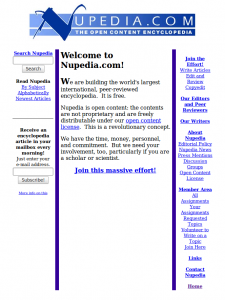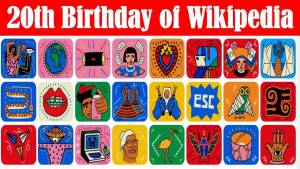I wish I could remember where I was and what I was doing on January 15, 2001. I know I was living in Austin, Texas and working as a proofreader at McElroy Translation Company. I was also in the middle of writing Home Field / An Illustrated History of 120 College Football Stadiums, a book that really went nowhere. But I did not realize that on that day a couple of men named Jimmy Wales and Larry Sanger were launching Wikipedia, an online free-content encyclopedia. The “wiki” part derives from a Hawaiian word that means fast, quick or speedy. Now, with 1.7 billion unique visitors per month and 55 million articles in 300 languages, Wikipedia is the world’s largest reference website. The San Francisco-based Wikimedia Foundation, a 501(c)(3) entity, hosts the site and develops other wiki-based projects.
were launching Wikipedia, an online free-content encyclopedia. The “wiki” part derives from a Hawaiian word that means fast, quick or speedy. Now, with 1.7 billion unique visitors per month and 55 million articles in 300 languages, Wikipedia is the world’s largest reference website. The San Francisco-based Wikimedia Foundation, a 501(c)(3) entity, hosts the site and develops other wiki-based projects.
(In 1999, Wales and Sanger had created Nupedia. It was similar to Wikipedia and yet different in that articles were subject to an extensive peer-review process. Nupedia posted just 21 articles its first year, as compared with Wikipedia’s 18,000. It has been defunct since 2003.)
Wikipedia is far from perfect—more on that later—but it’s sure helpful. Several times every day, I go there to learn about something. Maybe the issue is the 1974 Cotton Bowl between Nebraska and UT; or whether Marilyn Monroe was abused by Jack Kennedy, Bobby Kennedy or both; or Robert Morris, financier of the American Revolution (and the subject of a book I am currently reading); or Sherman’s march to the sea; or Donald Trump’s last-minute pardons; or the robbery/murder of Tessa Majors in New York City in late 2019; or Andong, a city in North Gyeongsang Province I visited in December; or why the Boy Scouts of America went bankrupt a year ago; or the uber-hurricane that hit Galveston in 1900; or Jerusalem in the Middle Ages; or the baseball career of Smoky Joe Wood; or the Sex Pistols’ Johnny Rotten; or corporal punishment (including, of course, people who derive  pleasure from giving and/or receiving such pain); or the 1947 UCLA basketball season; or the Bayeux Tapestry; or the throat cancer that killed Roger Ebert; or the Salem “witch” trials; or the life of Leadbelly; or the 1979 takeover of the main mosque in Mecca, Saudi Arabia; or Winston Churchill’s boyhood.
pleasure from giving and/or receiving such pain); or the 1947 UCLA basketball season; or the Bayeux Tapestry; or the throat cancer that killed Roger Ebert; or the Salem “witch” trials; or the life of Leadbelly; or the 1979 takeover of the main mosque in Mecca, Saudi Arabia; or Winston Churchill’s boyhood.
A randomly chosen example is Sherman’s march to the sea. One glance at the top of the Wikipedia page and I discern that it lasted from November 15 to December 21, 1864, that about 60,000 of Uncle Billy’s soldiers employed a scorched-earth policy against the hated Rebels, that it ended with the capture of Savannah, Georgia and so on. Just to the right, there is a vivid drawing by Alexander Hay Ritchie of the general and his men at work. Maps and other segments show how the military operation unfolded, and I am free to check dozens of hyperlinks, along with footnotes, references and further reading. I do not contend that this is the court of final appeal about Sherman’s famous march. But Wikipedia gives an excellent summary.
Whether it is a strength or fatal weakness, the articles are written and edited collaboratively by anybody who has Internet access. Among the stated fundamental principles for so-called Wikipedians is neutrality—an impartial tone and verifiability rather than opinions and interpretations. They are told to studiously avoid POV, or point of view. In fact, I sometimes discern bias, factual errors are not unheard of, and the same can be said of dead links. Still, I regard it as (mostly) trustworthy.
The process by which Wikipedia is made and maintained simply does not excite me. I have no desire to contribute an article or to perform editing, although I appear to have the qualifications. A community of writers, editors, fact-checkers and high-tech wonks already exists. I applaud these people, and I do so without the slightest guile.
writers, editors, fact-checkers and high-tech wonks already exists. I applaud these people, and I do so without the slightest guile.
As much as I use and depend on Wikipedia, it would be unseemly for me to engage in gratuitous criticism. My gripes are few—how they come to us once a year and beg for money, how they stubbornly insist on using neo-racist terminology (very offensive to me, a person of European descent) and how they adhere rigidly to the PC line. Take, for instance, Wikipedia’s page on Rachel L. Levine, recently nominated by President Joe Biden to be assistant secretary of health. We are told that Levine “transitioned” in 2011 but not the fact that Levine was born male or what Levine’s original name was. Would it be improper to state such information about Levine? (I had to go elsewhere to determine that Levine was formerly Richard and to find a photo of him.)
Also, some frivolous topics are covered. There is a Wikipedia page, for heaven’s sake, about Cap’n Crunch cereal. All right, some people might want to know about this sugary breakfast food, but not many. Is every subject worthy of a Wikipedia page? Evidently not, because I have twice paid savvy people to create pages about me, following every known guideline, and submit them. Both were rejected, the second repeatedly. Don’t get me wrong. I am under no illusions about my  significance. But I have written 22 nonfiction books, number 23 is due out next month, and number 24 may follow next year. I have been a Korea Times columnist since November 2018. My website gets visitors, albeit far fewer than I would like. External references can prove that I labored on behalf of Jerry LeVias and Abner Haynes—both, needless to say, have Wikipedia pages—and spent more than six years in a vain effort to convince the French to send Jikji home. The Jikji Wikipedia page contains this line under the subhead “Controversy”: “The Committee to Bring Jikji Back to Korea led by the American Richard Pennington is one such organization in Seoul, Korea that is working to repatriate the Jikji back to Korea from France,” but I find it wholly unsatisfactory.
significance. But I have written 22 nonfiction books, number 23 is due out next month, and number 24 may follow next year. I have been a Korea Times columnist since November 2018. My website gets visitors, albeit far fewer than I would like. External references can prove that I labored on behalf of Jerry LeVias and Abner Haynes—both, needless to say, have Wikipedia pages—and spent more than six years in a vain effort to convince the French to send Jikji home. The Jikji Wikipedia page contains this line under the subhead “Controversy”: “The Committee to Bring Jikji Back to Korea led by the American Richard Pennington is one such organization in Seoul, Korea that is working to repatriate the Jikji back to Korea from France,” but I find it wholly unsatisfactory.
Wikipedia, which almost always comes out at or near the top when you do a Google search, has critics far more vociferous than I. One is Edwin Black, a syndicated columnist and investigative reporter for the New York Times, among other publications. “A growing community of the informed [oh, please!] believes that Wikipedia, the constantly changing knowledge base created by a global free-for-all of  anonymous users, now stands as the leading force for the dumbing down of world knowledge,” Black has written. “If Wikipedia’s almost unstoppable momentum continues…it threatens to quickly reverse centuries of progress in the sharing of verifiable knowledge.”
anonymous users, now stands as the leading force for the dumbing down of world knowledge,” Black has written. “If Wikipedia’s almost unstoppable momentum continues…it threatens to quickly reverse centuries of progress in the sharing of verifiable knowledge.”
I think he overstates the case. It should be no surprise that Wikipedia has a Wikipedia page. Go there and you will see self-criticisms regarding uneven accuracy, and linguistic and gender bias. Academics have long shied away from it, and grad students are urged not to cite Wikipedia in their theses and dissertations, as it is regarded as a tertiary source. There have been charges of censorship and blacklisting, heated arguments, hoaxes and lawsuits. Take it with a grain or box of salt, but let me remind you of one basic fact—Wikipedia is free. They do not charge, and there are no ads, no pop-ups, nothing to make you want to whack your computer screen with a sledge hammer. I would submit that Wikipedia, its faults notwithstanding, is a ubiquitous tree of knowledge and a boon to humankind. I am grateful to the scholars and ordinary people who make it a part of our lives.
So happy 2oth birthday, Wikipedia, and let’s hope there are many more!


14 Comments
Well stated, as usual, Richard. I can’t imagine not having Wikipedia as a quick resource and question why anyone would want it shut down. As a grad student I used it frequently- to get a general understanding and then a list of resources for further research that I could cite. Happy birthday indeed!
Thank you, Debbie. From what I have gathered, scholars are changing their attitude about Wikipedia…not such a crime to cite it in papers, theses and dissertations.
Anyone can choose not to cite it, but I really doubt anyone can choose not to use it. Wikipedia is quite helpful, even when it may present wrong or misleading data. To the end, researchers are suppossed to have enough knowledge to be aware of those. Inevitably, disagreement is a creative impulse. I agree with you, Richard!!
Muchas gracias, Dr. Limpias. I am curious, since you are an academic there at UPSA. Do some of your students cite Wikipedia in papers, theses and dissertations? If so, is it permissible??
I agree with your assessment. Do you remember when we were kids and the salesman for World Book Encyclopedia came to our homes? If I’m not mistaken, we bought a book a month starting with ”A’, then ‘B’, and so on, thus in 26 months, the plan was to own a full set. That didn’t really help during those months when we only had ‘A thru k”, to write a report for school on a subject that started with ‘S’. Oh well, I survived. Why doesn’t The World Book Encyclopedia get an early hit when I search something? Well I just checked their website and they charge $99 for access, no wonder I don’t use that site. So back to the point of making money, Wikipedia is a not-for-profit and thus ask for donations each year in December. I have never donated but now that I see that their competition wants $99, my $5 dollar gift to Wikipedia might not be such a bad investment. Wikipedia is not the end all site for research, but they are a good place to start.
I very much agree. I would have donated to Wikipedia long ago, but for their adherence to neo-racist terminology. I find this unacceptable, so they get none of my bucks. Also, their determined use of non-POV is a POV in itself–a fine example being the person Dr. Levine. Why not say she was formerly a he named Richard and show his photo? This information is available elsewhere, and they refuse to use it. Totally PC, and again I will not support such nonsense financially.
I want to congratulate the entire team that deals with wikipedia, a gigantic job for the information to reach us, from the smallest to the largest.
I always use this giant engine to get different information and I wish it never disappeared.
I’m glad you wrote about wikipedia, it’s well worth our congratulations, even if many don’t know how much work is behind it.
Wikipedia one of the best !!!
I feel the same, Elly. Thanks to those people who volunteer (!) and make Wikipedia a reality.
Richard-You really nailed it from my point of view. Wikipedia is very handy (rather like Amazon) but has many and serious flaws. Many of the articles are cut and paste jobs, word for word, from other internet sites. And you’re right about the PC ism. They have it bad! I also agree it has many, many articles that are utterly trivial. But still, it’s handy so I still use, kind of like Amazon.
Kevin–yes, some of the articles are made by a person (him- or herself?) beholden to him or her. Some are obviously done by a press agent or whatever, and in such a case how was it approved? Even so, at the end of the day–a cliche I hate and yet I’m repeating it–I value Wikipedia. Not a day goes by without me going there.
Hi everybody,
finally we all have an explanation for the “wiki” part 😉 and that it derives from a Hawaiian word that means fast, quick or speedy.
Thanks to Wales and Sanger the world is now just a click away. Amazing, thank you, Richard!!! Hug you, Sabine
And to you, my dear German friend!
Dear Richard,
alrighty, now I had some more time to really read your article:
you don’t have your own page in Wiki? I am indeed surprised, and that you pay to be included is also new to me. The question is, WHO judges that and according to what? According to which criteria is judged here. Do you think this has something to do with the quite justified criticism of Wikipedia? and it is a “club” of Wikpedians who are, so to speak, sworn to certain principles? Well, if that’s the case, you probably won’t find out exactly for that reason. I keep my fingers crossed that the truth wins and that we will find you in Wiki in the future with all the honors you deserve. I’ll keep an eye on you from good old Germany.
Richard:
Thanks for the fact-filled article. I thought it was full of good information although I use Google – rather than Wikipedia – several times a day. Very well done.
Best wishes,
Rex
Add Comment